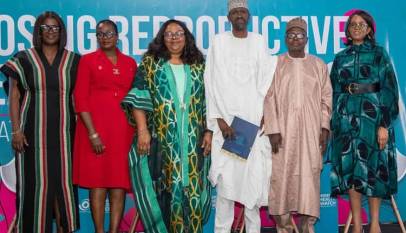KanSLAM: Fostering accountability in Kano’s MNCH, Covid-19 spending
Accountability is an integral part of democratic governance; it is necessary for improving service delivery and ensuring access to quality life for the citizens

Consequently, the work of Civil Society Organizations (CSOs) and the media are seen to be crucial in ensuring policymakers remain accountable to the governed. Thus, without a robust civil society and a vibrant media – which is defined as the “fourth estate of the realm” or rather the unofficial fourth arm of government– there will not be an accountable governance system in a constitutional democracy.
Moreover, ensuring efficient, transparent and accountable public governance, which is also central to the successful implementation of Sustainable Development Goals (SDGs), also requires a strengthened civil society-media coalition. In addition, a strengthened civil society-media relation is a sine qua non for enhanced citizens’ engagement with policymaking and governance processes towards improved service delivery.
In a bid to strengthen the media and civil society’s capacity to entrench the culture of transparency and accountability in health governance processes in Kano state, the group Kano State-Led Accountability Mechanism (KanSLAM), recently initiated an accountability framework for the tracking of funds meant for Maternal, Newborn and Child Health (MNCH), child birth spacing (CBS), Water, Sanitation and Hygiene (WASH), education as well as the campaign against the Covid-19 pandemic.
The framework was developed during a four-day workshop held recently in Kaduna which was jointly supported by the Foreign, Commonwealth and Development Office’s (FCDO) Lafiya programme and the Women’s Integrated Sexual Health (WISH) programme.
KanSLAM is a coalition of individual CSOs and coalitions as well as media organizations working across different areas of Human Capital Development (HCD) in Kano state. Its membership also include government representatives from relevant Ministries, Departments and Agencies (MDAs). Amongst others, KanSLAM, facilitates and support linkages with other key government structures to ensure harmony and better coordination as well as serving as a strong and unified coalition of voices in support of community involvement with respect to MNCH.
Dr. Aminu Magashi, coordinator of Africa Health Budget Network (AHBN), who led the development of the accountability framework said the framework was aimed at making the Kano state government responsive to the needs of its people by ensuring the government prioritizes the people’s critical needs, namely; health, education, as well as Human Capital Development (HCD), in its annual budgetary spending.
“The accountability framework identifies challenges, propose activities to address the challenges as well as monitor progress. The framework is a comprehensive one to be implemented over the next one year so as to promote sustainable development in Kano State. We are therefore supporting CSOs, government, media and health-related professional bodies to monitor activities within the budget process. After monitoring, based on available data, the government and CSOs will review the successes, look at the gaps, and determine what need to be done to ensure progress is made,” he said.
Maimuna Yakubu, the co-chair of KanSLAM says all the coalition seeks to do is support the government to actualize its set objectives. “We are trying to assist the government and want to be identified as key stakeholders. We also wish to engage the private sector because the government cannot provide everything, when resources from the private sector are combined with that of government, there would be a combined effect,” she told Newspage.
Ibrahim Waiya, president of the Kano State Civil Society Forum (KCSF), said the forum will consolidate its partnership with the CSOs working under the KanSLAM coalition so as to ensure effective implementation of the accountability framework. “There is a provision for expansion and involvement of other CSOs who are not represented here so as to carry them along; we would develop an expanded strategy which would involve as many Kano CSOs as possible; it would be implemented within the first quarter of 2021.”
Similarly, Dr. Basheer Mohammed, chairman of the Kano Emirate Council Committee on Health and Human Development (KeCCoHD), said as part of its mandate of improving the health and wellbeing of the Kano people, the Kano Emirate Council fully supports KanSLAM and its accountability framework. “The Emirate Council reaches out to the grassroots through its structure and with this framework in place, our duty will be to ensure its implementation. We will work to ensure increased uptake of healthcare, education and other services at grassroots level,” he pledged.
While also speaking to Newspage, Hajiya Yardada Maikano, Special Adviser to the Kano State Governor on Non – Governmental Organizations (NGOs), said the Kano State Government recognizes the contributions of CSOs in the development of the state hence the government was providing an enabling environment for groups such as KanSLAM to function in the state.
“The Kano state government recognizes the contributions of CSOs, and therefore carries them along in everything we do. Our intention after this workshop is to immediately swing into action to implement the framework developed. When I get back to Kano, I would write a report on what happened during this workshop, and I can assure you that the Governor will give all the necessary support to ensure the implementation of the agreed framework,” Hajiya Maikano said.
If effectively and committedly implemented, KanSLAM hopes the accountability framework would result in improved and timely release as well as effective utilization of funds meant for Human Capital Development (HCD) services. This cuts across maternal, newborn and child health (MNCH), child birth spacing (CBS), water, sanitation and Hygiene (WASH), education as well as the campaign against Covid-19, amongst others.














